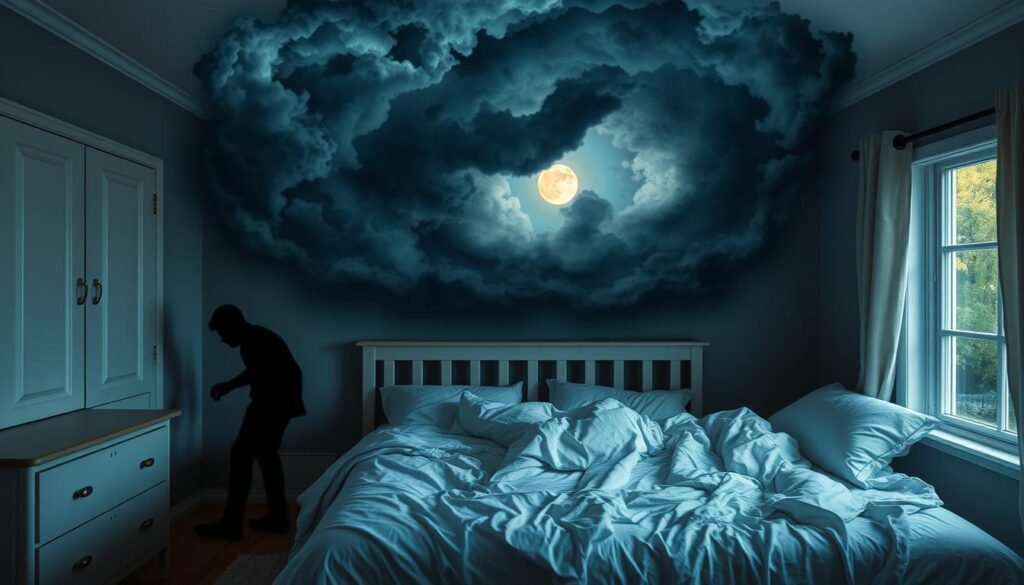Did you know that one in three adults report symptoms of clinical insomnia? Nearly 20 percent meet the criteria for an insomnia disorder. This fact shows how common sleep disorders are today. They’re often due to rising stress and anxiety among people. Most adults need 7 to 9 hours of sleep each night. Yet, stress and disrupted routines make it hard for many.
It’s key to understand how stress and anxiety mix into our daily lives. They do more than hurt our sleep. They also hit our overall mental health. When stress lingers or anxiety spikes, sleeping becomes tough. This situation can lead to various sleep disorders. Today, taking care of our mental health is crucial. It helps us sleep better and boosts our overall well-being.
Key Takeaways
- One in three adults exhibit symptoms of clinical insomnia.
- Adults should aim for 7 to 9 hours of sleep nightly for optimal health.
- Stress and anxiety are significant contributors to disrupted sleep routines.
- Chronic insomnia can impact mental health, leading to issues like depression.
- Recognizing sleep disorders is essential in managing overall well-being.
Understanding Stress and Its Impact on Sleep
Stress plays a big part in our sleep quality. It often leads to insomnia, making it hard to fall and stay asleep. Research shows that many adults struggle with insomnia. This lack of sleep can affect your day.
When you’re constantly stressed, your muscles stay tense. This can cause headaches and pain. It can also lessen your sexual desire and make you prone to illnesses like asthma.
About 20% of adults in the U.S. face anxiety disorders. A survey found that many people feel their daily life is impacted by anxiety. This has a big link to insomnia. Many people with depression also have anxiety. It’s important to understand these symptoms to help with sleep problems.
Finding out what causes your stress can help improve your sleep. Paying attention to how stress affects your sleep is key. You can try things like yoga and warm baths to relax. Keeping a regular sleep schedule also helps. For more information, visit this resource.
| Stress Type | Effects on Sleep | Associated Health Issues |
|---|---|---|
| Chronic Stress | Prolongs sleep onset, fragments sleep | Headaches, lower back pain, diminished sexual desire |
| Acute Stress | Triggers insomnia symptoms | Exacerbates asthma, increases respiratory issues |
What Is Anxiety and How It Affects Sleep Quality
Anxiety is a widespread mental health issue affecting many worldwide. It can worsen sleep quality, leading to insomnia. This problem makes it hard to fall asleep, causes frequent wake-ups, and results in feeling tired the next day.
There’s a two-way connection between anxiety and poor sleep. Lack of sleep can make anxiety worse, forming a hard-to-break cycle. Experts note changes in how anxious individuals sleep, like less deep sleep and waking up often. Treatments such as Cognitive Behavioral Therapy for Insomnia (CBT-I) can help.
Poor sleep can affect your mood and how well you function. Not sleeping well can lower brain function and make controlling emotions harder. Making your sleep area nice, sticking to a sleep schedule, and relaxing before bed can greatly help your mental health.
Those with insomnia may need over 30 minutes to sleep or not feel rested after sleeping enough. It’s key to manage sleep problems early on. Understanding anxiety and insomnia together helps in dealing with both better.
| Condition | Insomnia Symptoms | Interventions |
|---|---|---|
| Anxiety Disorders | Difficulty falling and staying asleep, early morning awakening | Cognitive Behavioral Therapy, relaxation techniques |
| Sleep Deprivation | Daytime fatigue, impaired cognitive function | Lifestyle adjustments, sleep hygiene practices |
| Insomnia | Persistent difficulty initiating sleep despite opportunities | Medications (short-term use), CBT-I |

The Relationship Between Stress, Anxiety, and Disrupted Routines Leading to Insomnia
Stress and anxiety often come together, disrupting routines that lead to insomnia. Many people find stress causes late-night thinking, which increases anxiety. This makes it hard to fall asleep. Research shows this stress-sleep issue can become a tough cycle to break.
Changes in life or sudden stress can break our normal routines. This can lead to trouble sleeping for a short time. Studies find that one in three adults globally face insomnia symptoms. If someone struggles to sleep well three times a week for months, it’s chronic insomnia. These sleep troubles can raise the risk of anxiety and depression.

People with chronic insomnia often fear going to bed. Sleep paralysis can make this fear worse, and bad dreams make sleeping scary. Anxiety disorders can mess up sleep patterns too, making it hard to sleep well.
Those with a deep fear of sleeping feel very stressed about it. This can lead to feeling upset, anxious, and even panic attacks. These fears may come from past trauma or ongoing sleep problems. Treating the root causes of insomnia, such as through therapy, often works better than just medication. Improving sleep habits and making lifestyle changes can help reduce stress and improve sleep.
Recognizing Symptoms of Insomnia Related to Anxiety
Knowing how insomnia and anxiety are linked is crucial for help and mental health care. Around 36% of people with anxiety disorders also struggle with major sleep problems. Insomnia shows up in different ways, such as short-term and long-term forms. These variations can change how a person feels and functions every day.
Insomnia often causes extreme tiredness during the day, mood swings, and trouble focusing. When anxiety gets mixed in, it makes things worse by causing muscle tightness and a fast heartbeat. The impact on mental health is huge. Not getting enough sleep makes anxiety worse, creating a tough cycle to escape from.
It’s important to tell the difference between short-term and chronic insomnia. Short-term lasts for less than three months. Chronic insomnia goes on for three months or more. Research shows that ongoing anxiety makes someone much more likely to get chronic insomnia. This is why it’s key to tackle both problems.
The following table shows how common insomnia is among those with anxiety and what effect it has:
| Condition | Prevalence (%) | Impact on Mental Health |
|---|---|---|
| Individuals with Anxiety Reporting Insomnia | 24-36% | Significantly affected sleep quality |
| Individuals with Hypersomnia and Anxiety Disorders | 27-42% | Potential for increased anxiety and depression |
| Chronic Insomnia Risk | 6-10% | Higher risks for cardiovascular issues and stroke |
| Short-Term Insomnia Experience | 1 in 2 adults | Temporary distress but can develop into chronic conditions if untreated |
Coping Strategies: Managing Stress and Anxiety
It’s key to understand and use effective ways to handle stress and anxiety. Many folks have trouble sleeping because of stress. This can be improved with certain methods. Techniques for relaxation and mindfulness are vital. They clear the mind and improve sleep.
Relaxation Techniques to Reduce Stress
Relaxation methods like deep breathing help lower stress. 44% of adults report sleep issues due to stress in the last month. Practicing gentle breathing exercises daily for two weeks can improve anxiety control and sleep.
These easy techniques soothe the mind and body. This makes falling asleep easier.
Mindfulness Practices for Better Sleep
Mindfulness practices like meditation and yoga are great for dealing with stress and sleeping better. Being mindful of the present helps stop stress-related insomnia. Writing in a journal also helps by processing emotions for better sleep.
Cognitive restructuring changes negative thoughts. This leads to better anxiety control and sleep quality.

Healthy Sleep Habits: Creating a Restful Environment
Improving sleep quality is key, especially when stress and anxiety are in play. A peaceful environment is crucial for better sleep. It’s about more than comfort; it involves being mindful of your bedroom setup. A regular sleep schedule can significantly improve sleep onset and duration.
Importance of a Consistent Sleep Schedule
A regular sleep schedule keeps the body’s clock on track. Sleeping and waking up at the same times every day help. This routine lets your body know when it’s time to sleep, boosting sleep quality. Here’s a table showing how much sleep each age group needs:
| Age Group | Recommended Sleep Duration |
|---|---|
| Newborns (0-3 months) | 14-17 hours |
| Infants (4-11 months) | 12-15 hours |
| Toddlers (1-2 years) | 11-14 hours |
| Preschoolers (3-5 years) | 10-13 hours |
| School-Age Children (6-13 years) | 9-11 hours |
| Teenagers (14-17 years) | 8-10 hours |
| Adults (18-64 years) | 7-9 hours |
| Older Adults (65+ years) | 7-8 hours |
Eliminating Distractions from the Bedroom
To sleep well, limit distractions. Address noise, light, and use of electronics. Below are tips for an ideal sleep setup:
- Noise: Use earplugs or white noise machines to block annoying sounds.
- Light: Use blackout curtains or eye masks for darkness.
- Temperature: Keep the room cool, between 60-67°F (15-19°C).
- Mattress and Pillow: Find a comfortable mattress and pillow for support.
- Electronics: Avoid screens before bedtime to reduce light exposure.
Professional Help: When to Seek Support
If you’re struggling with ongoing anxiety and sleepless nights, knowing when to get professional help is crucial. This often means you need care that’s right for you. Treatments like Cognitive Behavioral Therapy (CBT) have really helped people with anxiety and sleeping problems.
Medication can be key in managing these issues. There are different kinds for treating sleep troubles, including:
| Type of Medication | Examples |
|---|---|
| Sedative Drugs | Temazepam, Triazolam |
| Z-drugs | Zaleplon, Zolpidem |
| Dual Orexin Receptor Antagonists | Suvorexant, Lemborexant |
| Sedating Antidepressants | Trazodone |
| Melatonin-Related Drugs | Ramelteon |
| Over-the-Counter | Diphenhydramine, Doxylamine |
Talking to mental health experts can help with insomnia. They tackle not just symptoms but also what causes them. Seeing a healthcare provider means getting full info on treatments and side effects. It’s important to look at each person’s age and health when making a treatment plan.
Studies show that Cognitive Behavioral Therapy is very effective for long-term sleep issues. After 5 to 8 sessions of CBT, many people see a big improvement in how fast they fall asleep and how long they stay asleep.
Besides therapy, sleep therapy often uses techniques like sleep restriction and stimulus control. These methods work on developing better sleep habits. They make professional help even more valuable.
Conclusion
The link between stress, anxiety, and disrupted routines deeply affects sleep. It’s key for those wanting better sleep to grasp this. Over 30 percent of adults and 90 percent of teens have sleep problems. This often leads to more anxiety.
To fight insomnia, it’s smart to keep a regular sleep schedule. This simple step can make a big difference.
Learning to manage stress and anxiety helps you sleep better. Techniques like relaxation and mindfulness can make a big impact. Plus, half of the people with insomnia also have mental health issues. So, getting professional help is important.
Better sleep requires understanding sleep issues and taking care of your overall well-being. Working on the reasons behind insomnia and being proactive can boost sleep quality. Making sleep a priority means more joy and satisfaction each day.